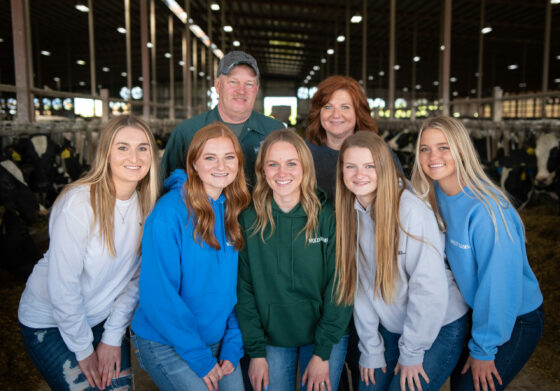The Woldt family in Calumet County continues to adopt new conservation efforts with the goal of inspiring others to follow suit.

Established in 1911, Woldt Farms is a fourth-generation family farm owned and operated by Daryl Woldt, his wife, Amy, and their five daughters, Kelsey, Kayla, Kristen, Karly and Kortney. Over the years, their farm has grown from having 80 milking cows to 1,650 cows and 4,000 acres.
In recent years, they’ve adopted a variety of sustainable farming practices. Today, they use no-till and cover crops on 95% of their farm fields. They have also been planting into cover crops (otherwise known as “planting green”) for the last two years.
These practices have become an essential component of their overall farm management. The Woldts have witnessed significant environmental and financial benefits resulting from the practice changes.
“On our farm, we see a big advantage with using sustainable farming practices,” Daryl Woldt said. “It helps us reduce our input and labor costs. We like how they’re working for us.”
The Woldts joined the Calumet County Ag Stewardship Alliance to connect with other conservation-minded farmers and also stay updated on the latest research.
“It’s great to be a part of this group and be able to connect with other farmers who are using these same practices and also wanting to learn more information,” Woldt said. “Collectively, we’re always trying to improve for the benefit of the environment and for our community as a whole.”
Annual Survey Results
As part of their membership, the Woldts participated in the group’s 2023 Member Conservation Practice Survey. This highlights the collective conservation efforts among farmers in the group. It demonstrates potential environmental impacts and benefits to the local community. This is the fourth consecutive year the group has documented members’ sustainable practices.
The group, composed of 21 farmers and four community members, implemented various conservation practices including: 7,479 acres of cover crops, practicing no-till and strip-till on 9,538 acres and planting green on 3,518 acres. They also measured nutrient management impact on 18,283 acres.
The potential environmental benefits of these practices:
- Reduction of greenhouse gas emissions by 1,287 tons of carbon dioxide equivalents. This is equal to greenhouse gas emissions produced by 306 cars driven in a year.
- Prevention of sediment loss from farm fields of 21,193 tons, equivalent to 2,119 dump trucks’ worth of soil.
- Reduction of phosphorus runoff by 15,063 pounds of phosphorus. This potentially prevents 7.5 million pounds of algae growth in local water bodies.
Data was analyzed and verified by Farmers for Sustainable Food and the Wisconsin Department of Agriculture, Trade and Consumer Protection.
The Woldts recognize the annual survey results are an opportunity to inspire other farms on their path to sustainability.
“We hope to see these numbers grow in the next few years as farmers start to realize the benefits of sustainable farming,” Woldt said. “Even if they just start with a few acres, we think they would see the benefits and continue to use them on more of their farm acres.”
Individuals interested in involvement with CCASA can find more details at calumetcounty.org.

